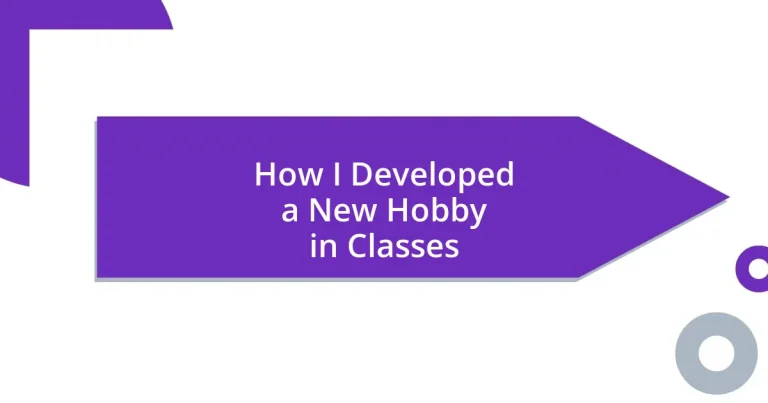Key takeaways:
- Choosing a hobby should align with personal values and bring joy, as seen in the author’s experiences with gardening and dance classes.
- Identifying the right classes involves evaluating personal interests, skill levels, class formats, and community vibes to maintain motivation.
- Setting realistic, manageable goals helps prevent frustration and enhances the learning experience, allowing for small victories along the way.
- Engaging with peers for support fosters motivation and creativity, transforming solitary hobbies into enriching shared experiences.
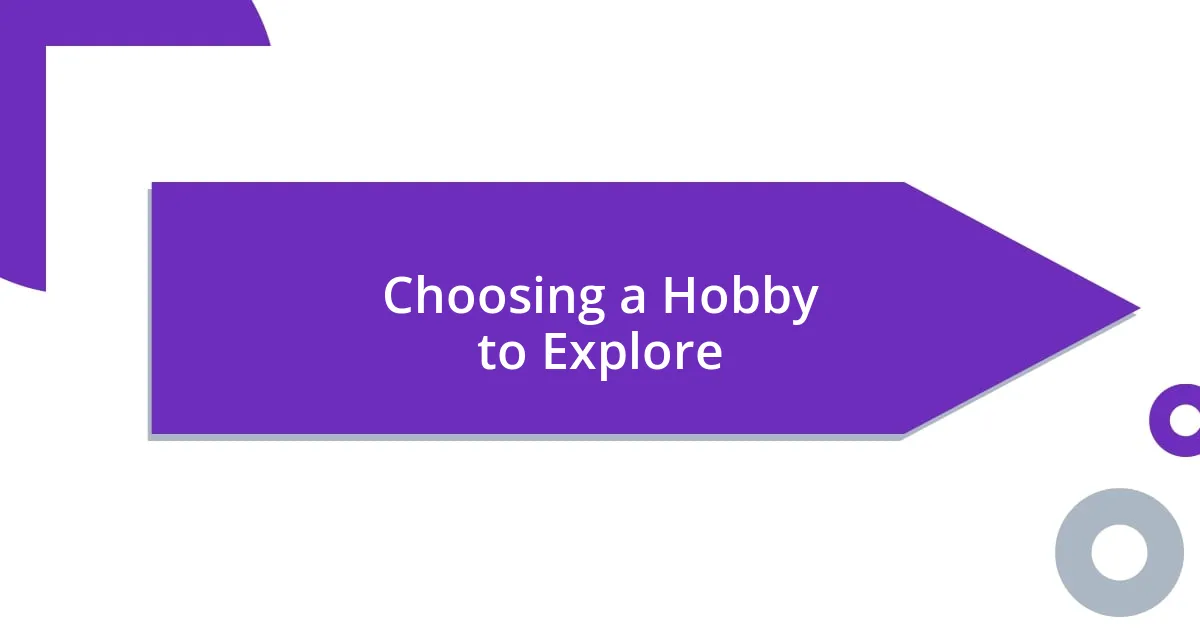
Choosing a Hobby to Explore
When I was on the hunt for a new hobby, I found myself reflecting on what truly brought me joy. I remember browsing through a local arts fair, captivated by the vibrant colors of paintings and the craftsmanship of handmade pottery. Isn’t it fascinating how certain activities resonate with us?
Choosing a hobby isn’t just about what we’re interested in; it’s also about what aligns with our values and lifestyle. For example, I once picked up gardening. Initially, it felt overwhelming, but the joy I experienced watching my plants grow was nothing short of magical. Did you know that nurturing something from a tiny seed can bring about a sense of accomplishment that many people crave?
Diving into a new hobby should feel exciting, not daunting. I recall the first time I attended a community dance class—my heart raced with anticipation. Once I started moving, however, I realized it was liberating. Have you ever felt that rush of excitement when trying something new? Finding that connection can transform a hobby into a passion.
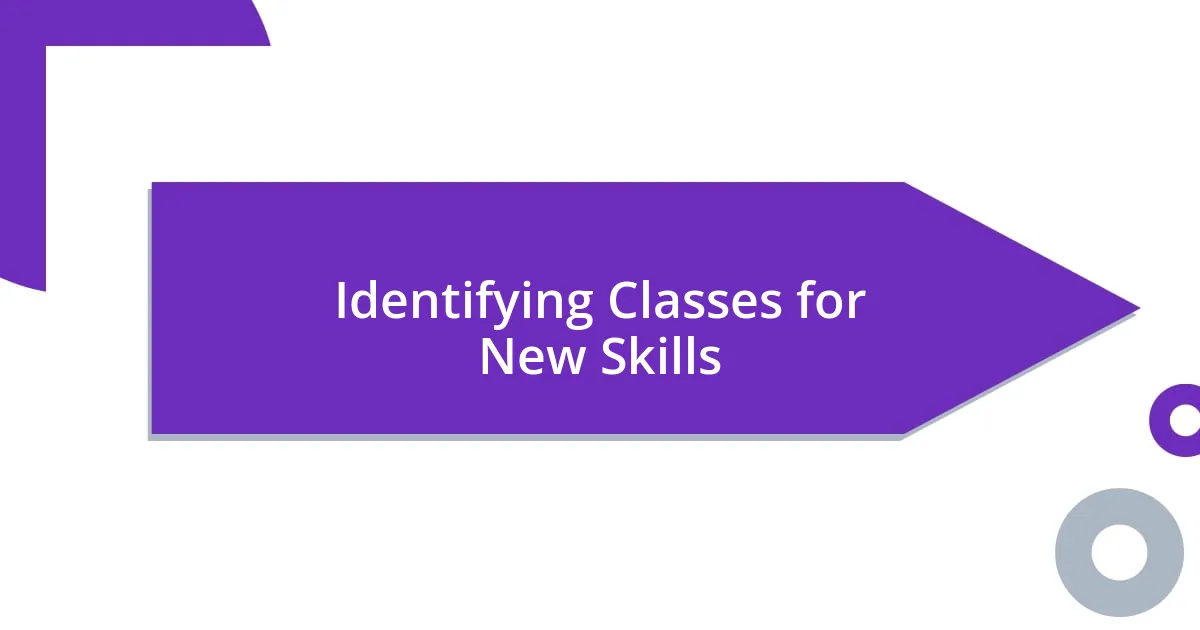
Identifying Classes for New Skills
Identifying the right classes for new skills can feel like searching for a needle in a haystack. I found that thinking about what I wanted to learn made the process more manageable. For instance, when I decided to learn photography, it was vital for me to find a class that focused not just on technical skills but also on unleashing creativity.
Here’s how I approached the search:
– Interest Areas: List topics that genuinely excite you, even if they seem a bit out of reach.
– Skills Needed: Consider the skills you currently have and how they might align with a new class.
– Class Format: Think about whether you prefer hands-on workshops, online sessions, or a more traditional classroom environment.
– Community Vibe: Look for classes where you feel a sense of belonging and support from instructors and peers.
Selecting classes with these elements in mind helped me feel more inspired and less intimidated. It’s amazing how a thoughtfully chosen class can light that spark of enthusiasm!
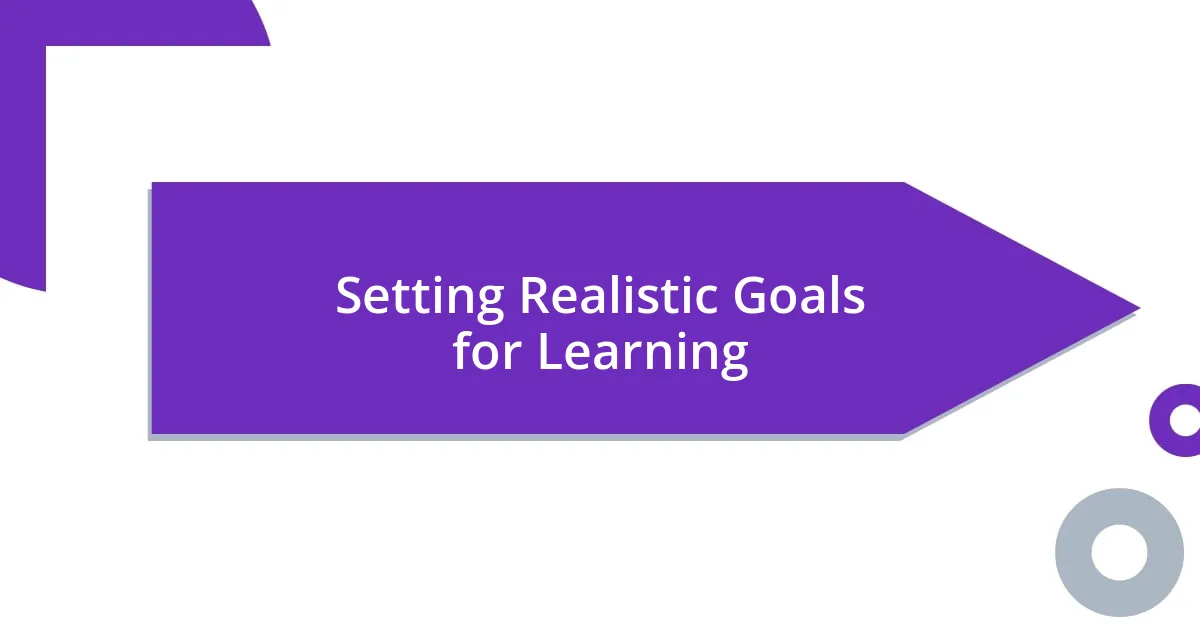
Setting Realistic Goals for Learning
Setting realistic goals for learning is an essential step in making progress with a new hobby. I remember setting out to learn the guitar. Initially, I wanted to master complex songs within weeks. However, I quickly realized that starting with simple chords was more achievable. This shift not only reduced my frustration but also helped me enjoy the learning process more. Ever felt that same overwhelming desire to leap ahead, only to find it backfiring? I certainly have.
When I think about goal-setting, I find breaking down larger objectives into smaller, manageable tasks incredibly helpful. For example, instead of aiming to play an entire song, I focused on mastering just one chord progression each week. This tactic allowed me to celebrate small victories along the way, like finally strumming that elusive D minor chord. It’s those small milestones that keep motivation alive—don’t you think?
Lastly, it’s important to be flexible with your goals. One week, I might have planned to spend two hours on practice, but life got busy, and I could only manage half that time. Instead of feeling disheartened, I adjusted my expectations and reminded myself that progress is not always linear. Learning is a journey, filled with ups and downs, and accommodating those fluctuations makes it much more enjoyable.
| Goal | Example |
|---|---|
| Initial Goal | Master complex songs |
| Realistic Goal | Learn one chord progression each week |
| Emotional Insight | Feeling overwhelmed vs. celebrating small wins |
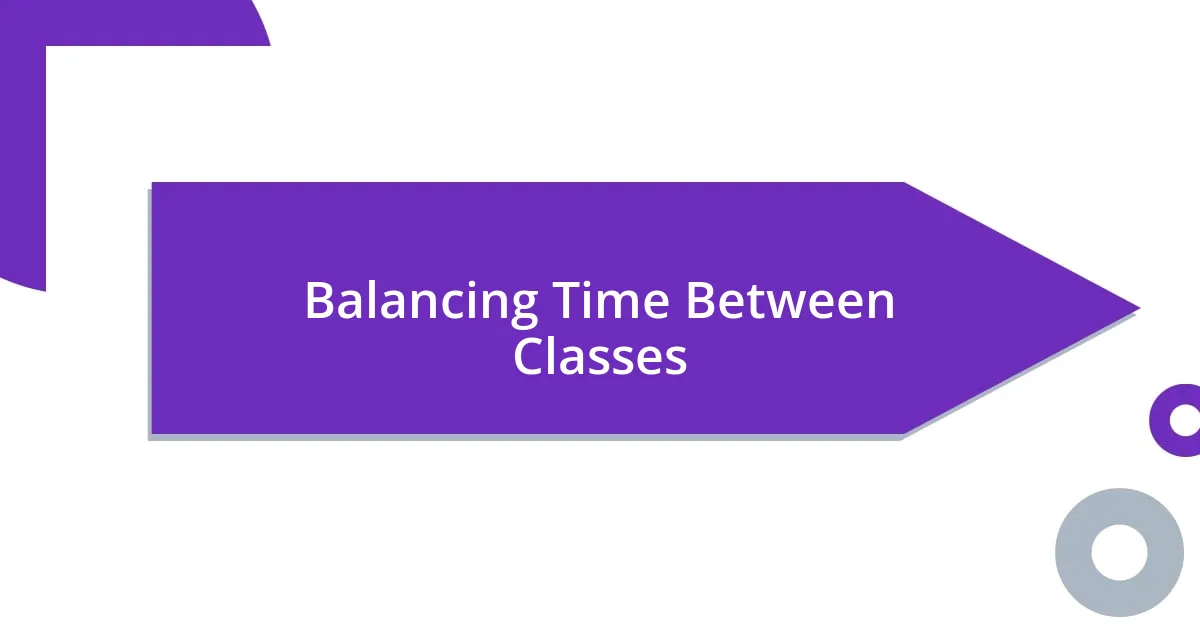
Balancing Time Between Classes
Finding a balance between classes can sometimes feel like juggling on a tightrope. I can recall a semester when I took three classes while trying to keep up with my newfound interest in pottery. Every week, I had to evaluate my schedule, shifting things around to make time for both my studies and creative pursuits. Have you ever had to navigate a busy schedule like that? It’s not just about fitting everything in; it’s about making sure I gave my best to each commitment without feeling overwhelmed.
I found it helpful to create a visual schedule. I used color-coding for classes, study time, and my pottery sessions, which made everything easier to manage. Honestly, seeing my time laid out in this way transformed me from a chaotic mess to an organized planner. It’s amazing how a simple tool like that can make the difference—wouldn’t you agree? But managing time isn’t just about logistics; it’s also about maintaining mental space.
However, I learned to build in downtime, too. For instance, I allocated at least one evening a week just for relaxation. It became my sanctuary—a time to recharge and reflect on my week. This breathing room was vital. Without it, I found myself burnt out and losing motivation both in class and with my hobby. Life is really all about finding that equilibrium, don’t you think?
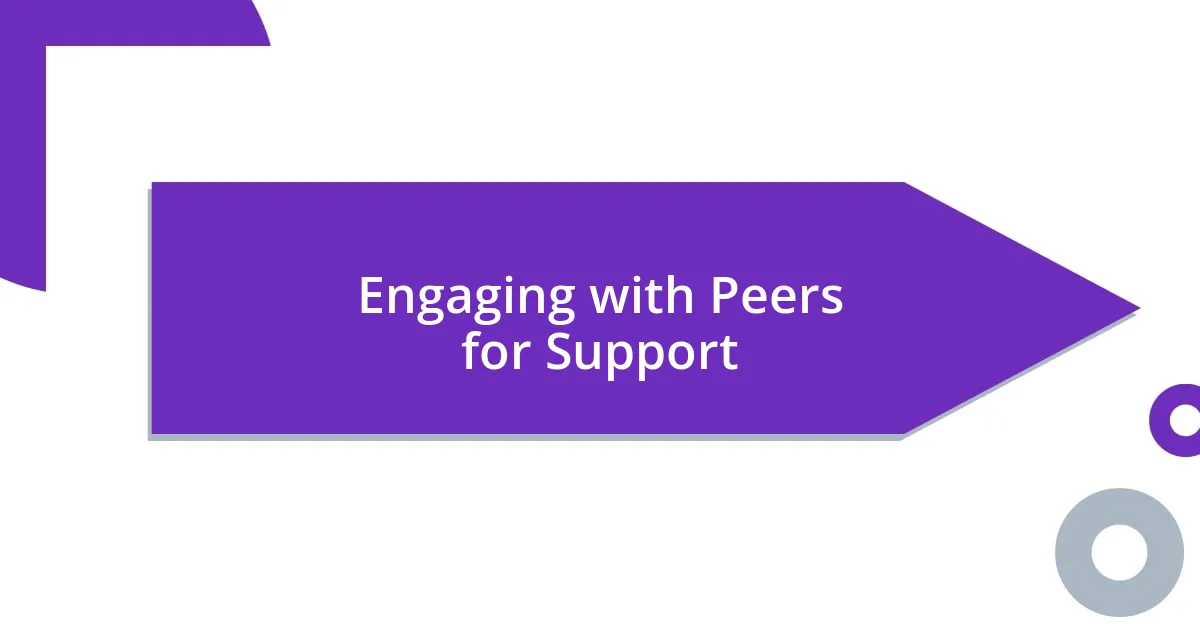
Engaging with Peers for Support
Engaging with peers for support can feel like a game changer when developing a new hobby. I recall feeling somewhat isolated while attempting to learn painting on my own. One day, I decided to join a weekend workshop with fellow art enthusiasts, and WOW, the energy was infectious! It’s incredible how sharing ideas and struggles with others can reaffirm my commitment. Have you ever felt that sudden spark of motivation just by being around like-minded people?
Collaboration can uncover new perspectives, too. Last month, while working on a ceramics project, a classmate suggested experimenting with different glazing techniques. Trust me, stepping out of my comfort zone and trying something new made the process far more enriching. When I look back on my experiences, I often wonder how many other creative breakthroughs I might have missed without that peer interaction.
Lastly, offering support to others can be just as rewarding as receiving it. I remember assisting a newcomer in a knitting class who was struggling with her first scarf. Seeing her light up when she finally got it right brought back all my own initial excitement. It’s like this circle of shared experiences builds a stronger community. So, how do you engage with your peers? Seriously, if you tap into that network, you might find it elevates your hobby in ways you never imagined.
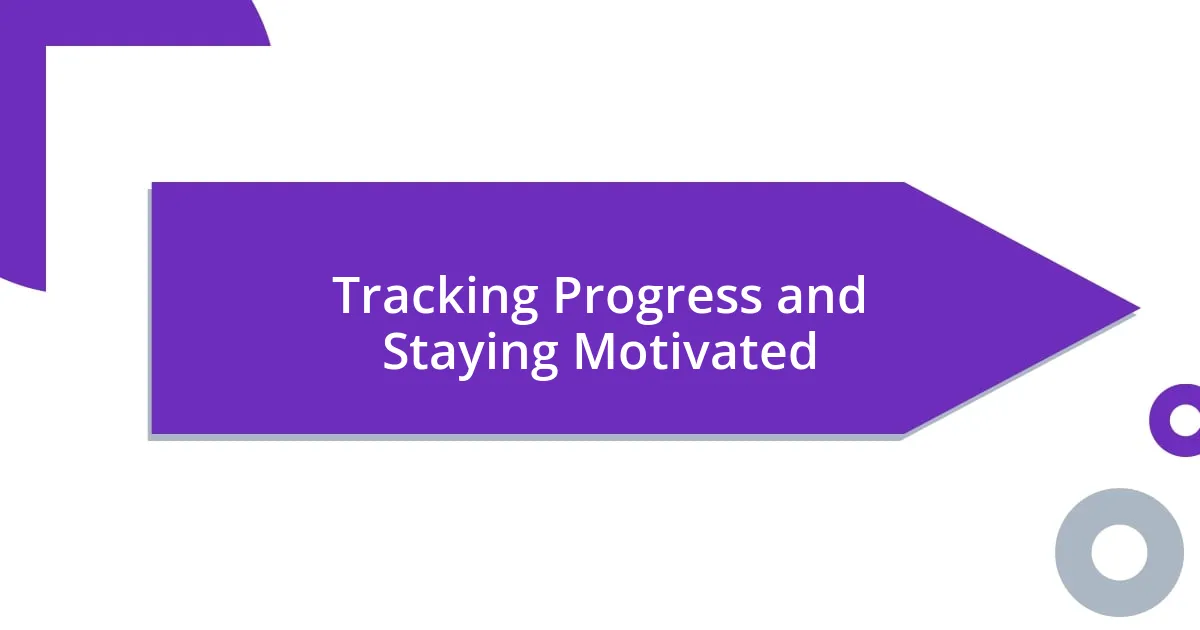
Tracking Progress and Staying Motivated
Tracking my progress in pottery became a habit that not only kept me motivated but also enhanced my skills. I remember creating a little journal dedicated solely to my pottery journey. Each week, I documented my projects, noting what worked and what didn’t. Looking back, it’s amazing to see my growth. Have you ever kept a journal for your hobbies? It can be a powerful reminder of how far you’ve come.
What truly helped me stay motivated was setting small, achievable goals. For instance, I aimed to master one new technique every month. Hitting those milestones gave me a sense of accomplishment and kept the excitement alive. There’s something undeniably satisfying about ticking off a completed goal, isn’t there? Whenever I felt stuck, I replayed those victories in my mind as a way to reignite my passion for pottery.
Additionally, I began sharing my progress on social media, which connected me with a broader community of pottery lovers. Every time someone left an encouraging comment or shared a similar experience, it felt like a warm hug of support. This interaction fueled my desire to push my boundaries even further. So, how do you celebrate your achievements? Finding ways to acknowledge your progress can be a significant motivator when pursuing a new hobby.












